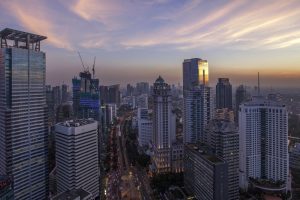During the Jokowi presidency, Indonesia has not been shy about using foreign capital to fund economic development. In fact, it has been a very deliberate policy choice. The government wants investment, including from abroad, and has not been afraid to run deficits in order to get it. In 2019, Indonesia’s current account had a $30 billion deficit in large part because of financial outflows being paid to foreign investors and creditors.
Since 2016, Indonesia has averaged $16 billion in net foreign direct investment every year, and $13 billion in more liquid assets like stocks and bonds. That is a lot of money coming into the country to finance infrastructure projects and development. But it also means foreign creditors have been establishing claims on Indonesian assets. This has been a long-running concern for some, who wonder if foreign creditors are chipping away at Indonesia’s economic sovereignty or creating opportunities to wield geopolitical leverage.
When we think of economic development and foreign capital, we often assume it is the foreign investor who has all the leverage. It’s their money, so they can dictate terms. But the recipient country is hardly a passive participant. A better way of thinking about it is that investment – any investment – involves risk. The important question is not whether risk exists, but whether the countries incurring debts are using them to maximize productive opportunities while minimizing the risks involved. I have a new paper out in the Pacific Review where I look at how this dynamic has been playing out in Indonesia.
Perhaps the most important thing to consider is the sources and types of foreign capital. If a country relies overwhelmingly on a single type of foreign capital (such as direct investment) from a single source (such as China) it obviously exposes that country to a considerable degree of risk should anything go wrong. This is more or less what has been happening in Laos, which accumulated large liabilities through direct investment and lending primarily from China. In that case, the creditor can wield significant influence and it does limit the options of the debtor country.
But foreign investment is not a monolith, and different countries engage with it in different ways. China is a major source of investment for Indonesia, but so is Europe, Japan, South Korea, and the United States, among others. These foreign investors are involved in a range of different sectors from energy to mining to auto manufacturing, and inward investment comes in many different forms including bonds, stocks and direct equity investments or FDI. Foreign investment involves risk, but when the investment comes from many different places it spreads the risk around and reduces the possibility of a single creditor gaining outsized influence.
Another thing that mitigates risk is when a country deepens its domestic capital markets. Indonesia has had a stock exchange since the 1970s, but it wasn’t a place where many companies sought to raise a lot of capital until recently. In 2005, the Indonesia Stock Exchange had 336 listed companies with a combined market cap of $81 billion. By the end of 2022, the exchange had grown to 825 listed companies with a market cap of $609 billion.
If an Indonesian company wants to raise capital for expansion, it now has several choices. It can list on the domestic stock market, issue bonds, or make a deal with a foreign investor for direct equity participation. It can also list on foreign exchanges. Just a few years ago the options were more limited, as domestic capital markets were less developed. Deeper domestic capital markets help mitigate the systemic risk of foreign investment, because foreign capital is not piled into a single type of asset. It is spread around.
Does this mean that Indonesia can accumulate liabilities to foreign creditors forever and everything will be fine? Of course not. But the fact that foreign investment creates risk is hardly novel, and the details matter. With foreign investment coming from many places and spread across many sectors and asset classes, it lessens the risk that any one project (like, say, a very expensive high-speed rail line financed primarily by a single foreign country) will pose a systemic threat to the Indonesian economy.

































